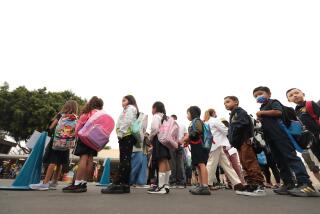Summer vacation is ending sooner
- Share via
Why, Daryl Klein wanted to know, was he standing outside the principal’s office at Burbank’s John Muir Middle School on this impossibly hot August day instead of enjoying the waning days of summer vacation at home, to be capped by a lazy Labor Day weekend?
As he spoke, the school, which began classes Aug. 27, had just been plunged into a power outage and the triple-digit weather only seemed to punctuate his point: It’s just not right for school to be in session in August.
Klein is no pie-eyed middle schooler but a parent volunteer, nostalgic for the days when Labor Day marked the symbolic bookend to summer vacation. For a growing number of California students -- and their frequently frustrated parents -- those days are gone.
The start of school has become a moving target, creeping ever earlier as educators are pressured to give students more time to prepare for standardized tests and finish fall exams before the winter holiday break. In Los Angeles County, 28 school districts -- more than one-third -- now begin classes before Labor Day.
Nationally, about three-quarters of public schools start classes sometime in August, according to education research firm Market Data Retrieval.
The trend even confounded California’s top school official: During his first year in office, Supt. of Public Instruction Jack O’Connell was asked to give a back-to-school speech by a small district in Kern County and asked which day in September he should prepare for. Make it July, he was told.
The earlier back-to-school dates signal fundamental changes that educators are making to increase the amount of instruction children receive, pressured by the demands to increase academic performance, education experts said. The key is whether educators will follow through by increasing the 180-day school term required by most states or lengthening the school day.
“There are bargaining agreements with labor unions, a lot of institutional procedures in place that make it difficult to move, but it’s happening,” said Jane Hannaway, director of the Urban Institute’s Education Policy Center.
The traditional September-through-June school calendar grew from economic necessity, devised when the United States was an agrarian society and children were needed to help harvest crops. But that’s no longer the case.
Today, the pressures of meeting the requirements of the No Child Left Behind Act, which mandates new state standards and requires teachers to be highly qualified, is driving the shift toward August start dates.
Although some evidence indicates more instruction improves student performance, opponents of the early start dates contend no research shows that simply moving school dates ahead improves test scores. But schools say they are under pressure not to be caught short.
“One of the driving factors (for our earlier start) is based on students’ performance relative to mandated tests,” said Joel Shapiro, deputy superintendent of the Burbank Unified School District, which includes Muir Middle School.
He said, for example, that tests for Advanced Placement classes are administered in May. Schools that start a week or two later have less instruction time. Also, teachers must prepare students for exit exams.
“When you have these high-stakes situations, we owe it to our students not to handicap them,” Shapiro said.
Educators also argue that an earlier start date means students will forget less over the summer, and districts have more flexibility to schedule longer breaks during the rest of the school year.
“With a shorter summer, there’s less learning loss, less of a need to review and to get back into patterns of behavior like lining up,” said Marc Winger, superintendent of the Newhall School District.
Classes in the 10-school, 7,000-student district began Aug. 15.
“We hear from parents who believe it’s best for kids to have a long, 10-week summer, and also parents who say I need them back in school. So you really can’t win.”
The Manhattan Beach Unified School District found that starting a few days earlier (Aug. 29) and by eliminating a few three-day holidays, it could create a weeklong Thanksgiving vacation.
The three-day weekends, teachers said, interrupted the flow of instruction and enticed parents to turn them into four-day weekends, pulling children out of school on Fridays.
“We did an analysis of attendance last year to make sure it was a good idea, and we actually picked up money in attendance because we didn’t lose kids turning three-day breaks into four,” said Deputy Supt. Janet Schwabe.
The Vineland School District in Kern County this year pushed its back-to-school date up a week, to Aug. 13, and created a three-week winter break from Dec. 21 to Jan. 14 to accommodate a student body largely made up of migrant families who travel during the holidays to Mexico and other regions, said Supt. Adolph Wirth. The last day of school is May 30.
School calendars reflect community needs, noted Wirth, whose district just south of Bakersfield has a rich agrarian history and served as the location for some of the scenes in the film version of John Steinbeck’s “The Grapes of Wrath.”
“Three Kings Day is a major religious holiday on Jan. 6 for the Catholic population, and my attendance drops that week, so it makes sense not to have school,” Wirth said.
Putting together a school calendar means juggling a host of competing interests: schedules for teachers and staff, summer school or summer work commitments, testing dates, holidays, school calendars in adjacent districts, synchronizing family calendars for siblings, even college start dates.
The Capistrano Unified School District experimented with starting classes Aug. 24 but ran into determined resistance from parents and teachers. The district found that it was losing money because students simply weren’t showing up. A poll of parents found that 73% opted for a post-Labor Day start. Last year, the district conceded and switched the start of school to the day after Labor Day.
“Not only were we losing ADA (average daily attendance funding) for those kids, but the teachers were complaining about settling into the first or second week of school and having to start all over again shuffling students,” said Michelle Benham, the district’s executive director for assessment and research. “I love schedules. But when I was assigned to be in charge of planning the calendar people, chuckled and then I understood why.”
Indeed, the summer encroachment is generating a backlash.
A trio of Muir Middle School eighth-graders were not shy in sharing their opinions with Principal Dan Hacking.
“It’s a bad idea because we don’t get to have fun,” said Syeda Samreen, 13. “Your parents give you a long lecture about studying and getting all A’s, and I’d like to postpone the lectures as long as possible.”
“I think we should come back after Labor Day because some of us go places and want to go for a long period of time, but we only have that three-day vacation,” said Breana Abdulnour, 13.
Gabi Rodriguez, 13, said she didn’t like coming back early either but admitted that the early start date helps kids who don’t have much to do at home.
“That’s my girl,” Hacking said, laughing.
But Klein and other parents agreed that the earlier start date can disrupt family plans.
“We’ve had a long family tradition where everyone comes in for a get-together over the holiday and we can’t do that now,” said Klein, whose 12-year-old daughter, Kara, is a seventh-grader at Muir. “It’s a tradition broken.”
Making matters worse is that his 14-year-old daughter, Kristen, who attends another school, returns to the classroom after Labor Day, so she’s home alone. Even back-to-school shopping is askew, Klein said, because he has to buy early and misses the Labor Day sales.
Such complaints have prompted many parents to mobilize grass-roots efforts that have resulted in 11 states regulating back-to-school dates.
A Michigan law enacted last year mandates that schools begin after Labor Day, and Texas school districts this year cannot begin until the fourth week of August. Other states, such as Pennsylvania and Tennessee, are studying similar laws.
In many states, the debate centers on tourism, with state officials complaining of lost tax revenue and student workers who have to cut short their summer jobs and head back to classes. In some southern states, the sweltering weather -- which forces cancellations of athletic practices -- and broken down air-conditioning is driving the post-Labor Day movement.
Tina Bruno, who heads the Coalition for a Traditional School Calendar, argues that there is little research to suggest that students do better on standardized tests with an earlier school start. She said parents are coming together because they are being ignored by school boards.
“They see districts starting schools earlier and earlier, and their kids coming home exhausted because they’re not ready to go back and teachers are giving them horror stories,” said Bruno, a San Antonio mother who helped push the Texas law. “What parents want is to collaborate and compromise. Everybody wants to do what’s best for the kids.”
More to Read
Sign up for Essential California
The most important California stories and recommendations in your inbox every morning.
You may occasionally receive promotional content from the Los Angeles Times.














